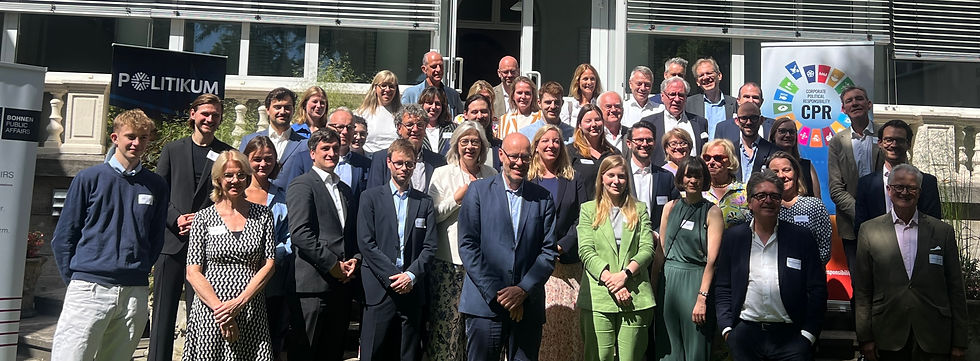Companies are Re-Evaluating DEI Initiatives Amid President Trump’s Crackdown on “Woke” Culture
- bohnenpublicaffairs
- Apr 29, 2025
- 3 min read

Nearly five years after major companies embraced Diversity, Equity, and Inclusion (DEI) following George Floyd’s killing, many are now retreating from these initiatives amid President Trump’s crackdown on "woke" culture. DEI, which aims to promote fairness and anti-discrimination in workplace, education and other institutions, had become a standard for many global employers (Gündemir et al., 2024) . At the same time, it can be seen as a component of Corporate Political Responsibility (CPR), as it supports the democratic ideal of ensuring equal rights, opportunities and representation for everyone. In turn, minority rights only enjoy effective protection in democracies, which is why companies that care about diversity are well-advised to help strengthen the liberal order.
However, fear of sanctions is growing among business leaders worldwide, especially those with strong U.S. ties. Shortly after taking office, President Trump banned federal agencies and contractors from setting DEI targets, calling them "public waste" and a "shameful discrimination." The term "woke" has become so politicized that major corporations like Meta, McDonald's, Walmart, Boeing and Ford are scaling back their DEI policies. Mark Zuckerberg even appeared on the Joe Rogan podcast, suggesting that the corporate world needs more “masculine energy" (Kort, 2025).
Whether this represents an ideological shift or simply reflects a pragmatic mindset, companies are certainly rethinking their strategies to avoid potential legal and financial risks amid a rise in conservative lawsuits alleging “reverse discrimination.“ Those that wish to remain "woke" now find themselves in a position where they need to uphold their values more discreetly. DEI strategist and author Lily Zheng told Deutsche Welle that "every corporate leader is now dealing with the fact that DEI in 2025 is going to be a lot more controversial, is going to be more of a risk, and is something that they have to manage" (Zheng, 2025).
European firms are facing the decision of whether to follow the U.S. lead or to stand firm in their commitments to DEI. Some, especially those with a large American market presence or subsidiaries, are scaling back their DEI efforts in response to legal and political pressures. According to the German newspaper Frankfurter Allgemeine Zeitung, companies like the Swiss pharmaceutical giant Roche, the car manufacturer Mercedes and the consulting firm Accenture are among those who are currently re-evaluating their DEI programs. In the upcoming years, German companies like SAP, whose largest market is the U.S., must brace for resistance as they pursue their goal of becoming "the world’s most inclusive software company" (Lindner, 2025).
While DEI opponents argue that it prioritizes identity over merit, lowers performance standards and unfairly disadvantages majority groups, proponents point out that it helps to expand the talent pool and ensures that all qualified individuals – and particularly historically underrepresented groups – have equitable access to opportunities. The latter interpretation suggests that DEI corrects imbalances, thus fostering careers that are based on skills rather than privilege. As David Glasgow, executive director of the Meltzer Center for Diversity, Inclusion, and Belonging at NYU, puts it, DEI is about "creating a level playing field for everyone" (Glasgow, 2025). By dismantling these initiatives under political pressure, companies would not only weaken workplace inclusivity but also stifle innovation. There is thus a business case for DEI - companies can attract and retain top talent, foster creativity and gain a competitive advantage. In this sense, DEI commitments can boost a company’s political branding and help to strengthen the conditions for long-term success.
Kabelka, L., & Sost, A. (2025). Anti-woke: With Trump returning, US firms back off on DEI. dw.com. https://www.dw.com/en/anti-woke-with-trump-returning-us-firms-back-off-on-dei/a-71125087
Gündemir, S., Kanitz, R., Rink, F., Hoever, I. J., & Slepian, M. L. (2024). Beneath the surface: Resistance to Diversity, Equity, and Inclusion (DEI) initiatives in organizations. Current Opinion in Psychology, 60, 101922. https://doi.org/10.1016/j.copsyc.2024.101922
Kort, K. (2025). US-Konzerne wollen nicht mehr "woke" sein. Handelsblatt Online.https://www.handelsblatt.com/unternehmen/management/mcdonalds-meta-warum-us-konzerne-jetzt-nicht-mehr-woke-sein-wollen-02/100098935.html







Comments